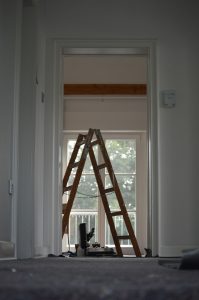Buying your first home is an exciting new chapter in your life, whether you are tackling it as a bachelor (or bachelorette) or with your soon-to-be wife (or husband).
It can be fun daydreaming about designing your new home, but one of the biggest mistakes you can make is putting the cart before the horse. First-time home buyers have the tendency to house hunt first and prepare later. Avoid this mistake, which can cost you time and money, by following these guidelines before buying your first house:
- Check your credit report and score. Don’t even bother reviewing all those online listings until you know whether or not your credit can handle buying a home. Even if your credit can handle it, you want to have a strong enough financial background that you will be able to get a lower interest rate on your loan. It is recommended to review this at least six months before the shopping process so that you can spend some time improving it.
- Know what you need, and prioritize. There is a difference between needs and wants, and when going into a large purchase like this, you may have to make some sacrifices of what you want for what you need. Factors such as the neighborhood, school district and location should all make your checklist. Basing your home buying decision on looks and layout alone may leave you feeling regretful.
- Know what you can afford. Getting your finances in order and knowing what you can afford each month for your new house will be imperative to avoiding future issues. Often, there are hidden costs that are forgotten once those papers are signed such as taxes, insurance, maintenance and so on. It is safer to over-estimate your monthly payments to ensure you are fully financially prepared. Another good home-buying practice is getting an idea of what your down payment will be. This venture is all about being as prepared as possible for all costs.
- Get pre-approved. Once you know your credit score, it’s time to see how much you are able to borrow. Sellers want to know this number, and it’s important for you to realize your spending range as well. Getting pre-qualified for a loan will help to save you time and energy as you begin the process.
- Find the best real estate agent for you. Buying your first home is no joke, so you should spend some time finding the right real estate agent for your needs, budgets and goals. Talk to co-workers, friends and families for referrals to try to find that person you feel like you can already trust. Take some time to shop around for a real estate agent as you shop around for your home. You may want to even look into hiring a realtor to take your search one step further and ensure that credibility.
- Consider educational seminars or consulting. The best way to make sure you are making a wise home-buying decision is to know your stuff. Research, know what you are signing off to and keep yourself educated on the process. You may want to look into one-day seminars offered by real estate companies or even consulting with a mortgage lender to really grasp what to expect.
- Get a home inspection. Last but certainly not least, get that home inspected. You definitely do not want to make such a large purchase without knowing what is beneath those walls. Issues within the home can be fixed prior to you taking over, which will be a huge relief off your shoulders. Just be aware of all the additional expenses in maintenance that would become your responsibility upon ownership.
Don’t be afraid to ask for help as you begin the home buying process. The more you understand, the better the chances are that you will set yourself up for financial success with your new home.
Jenn Clark is a writer, PR specialist, entrepreneur, blogger and coffee enthusiast. A lover of laughter, traveling and cheese, she’s written about her life experiences here at suburbanfinance while at the same time growing other young professionals. You can find more of her work at Jennblogs.co.


